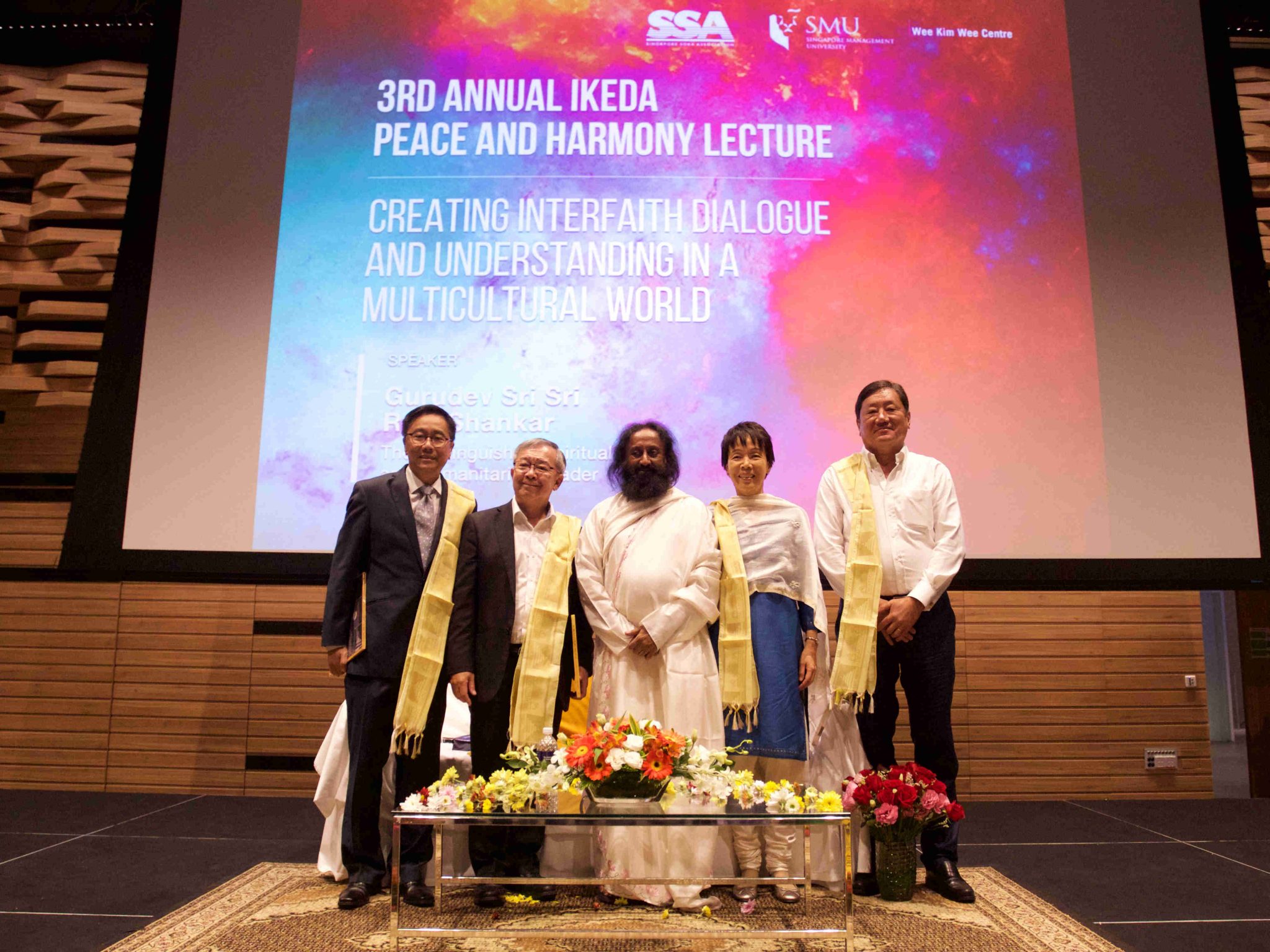
On November 20, Singapore Soka Association (SSA) supported the Singapore Management University’s (SMU) Wee Kim Wee Centre, in organising the Third Annual Ikeda Peace and Harmony Lecture at the SMU School of Law Function Hall, which was filled with over 800 people. The attendees included representatives from SMU and SSA, as well as members of the public.
The five-year annual lecture series is named in honour of the Soka Gakkai International (SGI) President Daisaku Ikeda, and seeks to actualise his conviction that dialogue is the surest path to peace. Helmed by distinguished speakers with varying expertise and backgrounds, the lectures seek to transform the current climate that is dominated by apathy and discord, to one where peace and harmony prevails.
Titled “Creating Interfaith Dialogue and Understanding in a Multicultural World”, the lecture was delivered by Sri Sri Ravi Shankar. A noted humanitarian and ambassador of peace, Sri Sri Ravi Shankar plays a vital role in conflict resolution and spreads his vision of non-violence at public forums and gatherings.
The lecture started with Director of Wee Kim Wee Centre, Associate Professor Kwok Kian Chow, introducing the topic of the lecture. He thanked the various working parties who had helped make the lecture possible and reaffirmed that the programmes of Wee Kim Wee Centre are underpinned by dialogue, conversations and discussions on cultural, gender, and religious diversity.
SSA Chairman Michael Yap, then delivered the opening address. He related SGS’s focus on creating opportunities for dialogue, including its work to foster a shared awareness that nuclear weapons in anyone’s hands is dangerous and wrong as a means of protecting the things and people we treasure. He said that the origins of SGI’s peace movement could be traced back to the declaration calling for the abolition of nuclear weapon by second Soka Gakkai president Josei Toda on September 8, 1957. “This is vital for achieving world peace,” remarked Mr Yap.
Following that, Sri Sri Ravi Shankar began his lecture by speaking on the current state of affairs in the world today. He highlighted the importance of reinforcing human values and respecting the dignity of human life through interfaith and intercultural dialogues. He also commented that in the recent times, peace appears to be temporary, and tension permanent, and people are so used to conflict that they forget what peace is.
“However,” the speaker asserted, “our true nature is that of peace.” Through the use of various anecdotes and stories, Sri Sri Ravi Shankar emphasised the importance of communication as a means to resolve and manage conflicts.
Pointing out three factors that prevent people from reaching out to others—sense of insecurity, the fear of failure and the fear of humiliation, he urged all to work on overcoming them and place more focus on caring for fellow human beings. “If people are able to put more emphasis on caring for each other, conflicts could have been averted and lives would not have been lost,” the humanitarian stated.
Rounding up the session was the Question-and-Answer segment, which was a lively discussion and interaction between the audience and the speaker. Questions came not just from scholars or students, but interested members of the public who took the opportunity to learn from the speaker.
The day’s lecture reiterated and reinforced the importance of taking action to engage in dialogue to bridge differences in achieving understanding in a multicultural world. As President Ikeda puts it, “dialogue can serve to help bring out the most positive potentials of each faith tradition, keeping them vital and preventing a lapse into empty formalism or dogmatism. And like any dialogue, interfaith conversations are meaningful only when they are based on a frank recognition and acceptance of difference; they can otherwise fall into a trivialising search for superficial commonalities.”
(SSA Times Issue 572)
